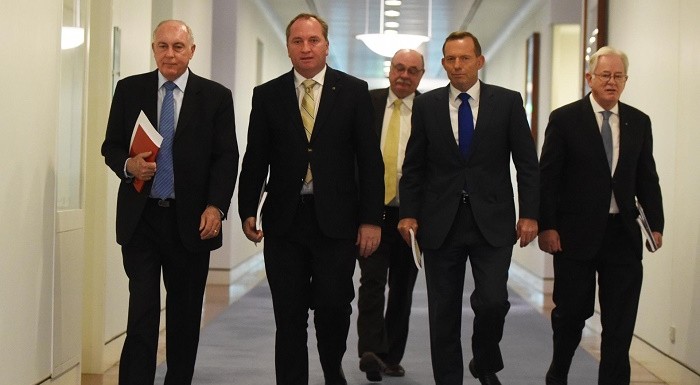The government has released a $1.2bn plan to make northern Australia an “economic powerhouse”, which includes greater temporary migration and expediting native title claims.
The white paper on developing northern Australia also recommends that the federal government cede part of its responsibilities on Indigenous cultural heritage, by accrediting state and territory schemes.
The joint Media Release from the Prime Minister, Minister for Infrastructure and Regional Development, and the Minister for Trade and Investment reads:
This is Australia’s first White Paper on developing Northern Australia, building on our Green Paper and pre-election statement. It is an essential part of our plan for a strong, prosperous economy and a safe, secure Australia. With a land mass covering over three million square kilometres, and a population of over one million people, the north has untapped potential. It is home to some of our most treasured icons including the Great Barrier Reef, the wet tropics of Queensland, Uluru, Kakadu and Cable Beach
The plan, unveiled by 14 north Australian Coalition MPs on Thursday, includes a chapter on “simplifying” land arrangements in the north. It notes that large sections of Australia’s north are Indigenous land holdings or covered under native title.
“Some of the rules governing land use in the north adversely affect economic development and discourage investment,” the paper says.
New roads, studies of dam sites and changes to land-use laws formed major parts of the Government’s development blueprint, which is designed to make the north an “economic powerhouse”.
The plan included a $600 million roads package, cash to upgrade airstrips and money to explore rail freight options, in addition to the $100 million beef roads fund and $5 billion concessional loans facility that were announced in the federal budget.
A $200 million water infrastructure fund will be set up and river systems across the north will be studied to see if they can support dams, or other storage options.
The Government is supporting simpler and more secure land arrangements in the north, by investing:
- $20.4 million to support native title bodies to realise their potential and negotiate more efficiently with business;
- $17 million to support secure property rights for cadastral surveys, area mapping and township leases; and
- $10.6 million for pilot land tenure reforms to help fund ‘next steps’ for projects that demonstrate the benefits of tenure reform, particularly on pastoral leases.
Land-use laws in the north have led to long delays and cost blowouts in construction and mining projects over the past decade, so the white paper included support for native title bodies and new surveys to start simplifying land arrangements.

As the ABC revealed at the weekend, the Government has released a new investment pitch to some of the world’s biggest companies and will hold a major forum in November in Darwin, in the hope of attracting billions of dollars in cash from overseas.
A new $75 million Cooperative Research Centre on developing the north will also be set up and there are measures to boost links with the broader Asia-Pacific region.
“We will drive down the costs of operating in the north for business; making it a more attractive place to invest and work,” Tony Abbott said in a statement.
“By making the right regulations and infrastructure investments, we can encourage jobs and tackle the costs of living far from major cities”.
Some ministers were pushing for special visas to allow more skilled migrants from South-East Asia to work in northern Australia.
But MPs involved in developing the white paper described today’s announcement as “just a deposit”, with more policy measures to be put in place in the next few years.
Queensland, Western Australia and the Northern Territory governments are expected to contribute to the cost of new developments.
Federal Opposition spokesman Gary Gray was worried the white paper would be “big on vision but light on achievable measures”.
Grand northern Australian development dreams are nearly as old as the nation itself and have repeatedly failed to materialise.
But ministers said the rise of Asia meant there was now agriculture, aquaculture, renewable energy, tropical medicine and tourism markets the north of the country could service.
They believe big multi-national funds will want to invest billions in the north of the country if the Government puts the right infrastructure and laws in place.

China backs ‘economic powerhouse’
China has backed the deal saying its trade deal with Australia will facilitate Chinese investment in farms and infrastructure in the region which is attempting to become part of Asia’s food bowl.
There will also be schemes to help attract workers to the regions. Overseas working holiday makers will have their visas extended for one year if they are employed in northern Australia. The three-year multiple entry visa will also be extended to 10 years in a bid to promote tourists, especially from China.
“We are committed to working with our tourism industry partners to lift demand for air travel across Northern Australia and realise the region’s economic potential,” Mr Joyce said.
Queensland Deputy Premier Jackie Trad welcomed the White Paper but said more federal funding needed to be allocated to key infrastructure projects.
Chinese Vice Minister of Commerce Wang Shouwen said Bejing saw opportunities in Australia’s north primarily in agriculture, food processing and infrastructure.
“Indeed our view is your strategy of developing the Northern Territory needs investment,” Mr Wang said in a briefing on the new free trade deal with Australia.
“China is the third largest investor globally and there is strong interest in investing in Australia … in the agricultural sector, food processing sector. China is very strong on infrastructure … and this [sector] could also benefit from more open investment,” he said.




